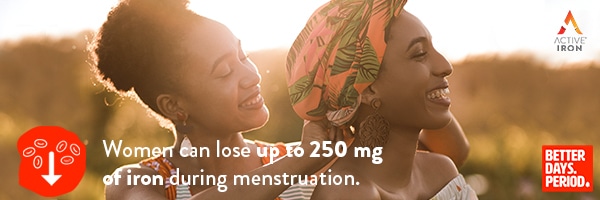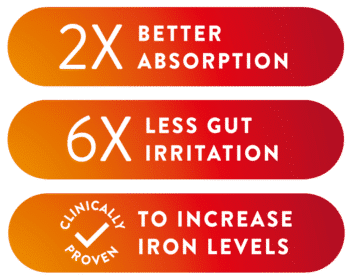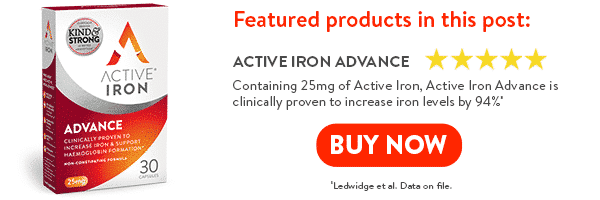- The benefits of iron
- Why is Iron absorption important?
- How to get enough iron
- How many mg of iron do we need per day?
- Why do women need more iron than men?
- Iron and childbirth: pre-pregnancy, pregnancy, & postnatal
- Who else can benefit from iron?
- Haem vs non-haem iron
- Side effects of iron
- What are the signs iron supplements are working?
- Conclusion: the role of iron
Iron is an essential building block for forming haemoglobin (red blood cells), which transfers oxygen around our bodies. Iron also plays a vital role in cognitive function, immune function and energy production in our bodies.
While iron is naturally present in many foods, it may not be in sufficient quantities depending on your iron requirements. Iron supplements offer an excellent solution for those who struggle to meet their iron requirements through diet alone.
This guide will help you make sense of the importance of iron, where you can find answers to your questions regarding:
- The benefits of iron
- Why iron absorption is important
- How to get enough iron
- How many mg of iron we need per day
- Why women need more iron than men
- Iron and childbirth
- Who else needs iron
- Haem vs Non-haem iron
- Iron side effects
The benefits of iron
Iron has several functions in the human body, contributing to good health and proper functioning.
Energy production
Iron is one of the most vital minerals for our cells. Our primary energy source is food, and our cells need Iron to convert food into energy. The more Iron you have in your body, the more energy you will have. However, an excess of Iron can lead to some health problems, so stay within the recommended range.

Reduction of tiredness and fatigue
A 2012 study showed that women who took iron supplements experienced 48% less fatigue than women who didn’t take them. This study explains why Iron is so important, especially for those who need to produce more energy, like endurance athletes. Meeting your daily iron needs may help you feel energised and meet life’s challenges at work or home with family and friends.
Cognitive function
Iron is essential for cognitive function, including memory, problem-solving, concentration, and learning. Your brain will perform at its best if your body has enough iron in its system. In fact, with adequate iron levels you may find that you don’t need to drink coffee every 2-3 hours to improve your concentration!
Immunity
There’s a significant link between Iron and the immune system, and Iron is a critical mineral that helps create cells and grow. Moreover, Iron plays a role in your immune health because it is necessary for immune cell proliferation and maturation, particularly the lymphocytes, associated with your body’s general response to infection.
Oxygen transport
One of the most essential functions of Iron is the transportation of oxygen in the haemoglobin of red blood cells throughout your body, so your cells can produce energy. Also, Iron improves oxygen storage through myoglobin. Myoglobin is a protein that transports and stores oxygen within your muscles. Myoglobin contains Iron.
Formation of red blood cells and haemoglobin
Iron is involved in haem synthesis, and it forms haemoglobin, a protein in your red blood cells. Haemoglobin transports oxygen from your lungs to your body’s tissues to help you maintain essential life functions. Without this process, your body won’t be able to get enough oxygen, and you’ll start feeling tired or fatigued.

The first and most important thing you need to realise about iron and iron supplementation is that iron needs differ from person to person.
While this may seem like common knowledge, a quick Google search of “How long does it take for iron supplements to work?” will produce all a range of answers from weeks to months to years, based on an individual’s personal experience. Active Iron has been clinically proven to increase iron levels by 94% within six weeks.
Why is Iron absorption important?
Iron absorption is the amount of iron your body can actually use, and is different from the amount of iron you consume through food and iron supplementation. Many factors influence iron absorption, such as diet, gender, and intensity of exercise. The side effects of poorly absorbed traditional iron supplements are well known: including nausea, reflux, and constipation.
According to a journal in the National Centre for Biotechnology Information, only a fraction of ingested iron is absorbed by the body. This amount may range from only 5% to 35%.
Inadequate iron levels are a global problem affecting 2 billion people¹ worldwide, with 1 in 4 women² impacted. Iron supplements offer an excellent solution for those who struggle to meet their iron requirements through diet alone.

Poor iron absorption from foods may be because of malabsorption issues and gastric acid. Competing minerals or foods can also inhibit the absorption of iron. Some of these include:
- Tea
- Coffee
- Milk
- Eggs
- Wholegrain cereal
- Dietary fibre
The amount of iron absorbed can also depend on the circumstances and the type of iron.
Ferrous Iron absorption
Ferrous iron is the most common form of iron found in iron supplements. Ferrous iron is quickly oxidised to the insoluble ferric (Fe3+) form at the human body’s pH. It is the ferric iron that causes stomach upset associated with Iron supplements. When Fe3+ enters the first section of the small intestine, gastric acid lowers the pH allowing the transportation of Fe2+ across intestinal absorptive cells.
This lowering of the pH by gastric acid allows the transport of Fe2+. This process “enhances the solubility and uptake of ferric iron”, according to the review on iron and its importance for human health.
However, if gastric acid production is impaired then iron absorption will be reduced substantially.
Haem Iron absorption
The iron we eat comes in two forms: haem and non-haem. While our bodies can use both forms of iron, haem iron is much easier to absorb. Haem iron is the type of iron found in animal sources. Dietary haem is also transported across the intestinal absorptive cells where it transforms from haem oxygenase 1 (HO-1) to free ferrous iron (Fe2+) for our bodies to absorb.
Non-haem Iron absorption
The same process exists for the absorption of non-haem iron which is present in plant sources. Most ferritin appears to be degraded during digestion, so non-haem iron is harder to absorb from plant-based sources.
How long it takes for iron to be absorbed is largely dependent on when and how you take it as well as the form of iron you are taking and the foods that you are eating. Vitamin C-rich foods such as oranges, bell peppers, lemons, and supplemental vitamin C can aid iron absorption.
How to get enough iron
The foods you eat determine how much iron you get in your body. A varied diet containing plant and animal sources of iron may provide you with adequate iron intake. However, iron absorption can be impacted by gender, diet, and exercise. Some foods also act as barriers to your body’s ability to absorb iron sufficiently.
You may choose to supplement with iron pills daily if you:
- follow a restricted diet, such as vegetarian or plant-based diets
- are of reproductive age and menstruate
- are pregnant or breastfeeding
- exercise intensely
- have a history of inadequate iron levels
- or have digestion issues
Dietary iron sources
Haem iron, found in animal foods, is easier to absorb. Non-haem iron, found in plants, is more challenging for our bodies to absorb, meaning vegans and vegetarians need a higher daily intake of iron than meat-eaters.
● Beef, Chicken & Fish
Not only do these meat sources provide haem iron (which is easier to absorb), they also can stimulate better absorption of non-haem iron from plants. Adding these foods to a meal has been found to increase non-haem iron absorption by 2-3 times:
● Cereals High in Iron
Many breakfast bowls of cereals contain a good amount of iron as they have been fortified with the mineral. However, always check the label for iron content and check the other ingredients, too. Choosing a breakfast cereal with good iron content but low sugar could also be an option.
Iron content in foods
| Haem Iron | Iron content | Non-Haem iron | Iron content |
| BEEF | 2.2 mg of iron per every 3 oz serving. | MUSHROOMS
Chanterelle mushrooms |
200 gram-serving, this fungal food provides a mighty 6.94 mg of iron. |
| LAMB | 3 oz of lamb, you’ll receive 1.6 mg of iron. | CANNED TOMATOES
|
A half-cup serving of canned tomatoes carries 1.57 mg of iron. |
| HAM
|
3 oz of ham, you’ll receive 15 grams of protein and 1.3 mg of iron. | BLACK OLIVES | One 135 g serving of black olives has an astounding 8.48 mg of iron |
| DRIED BEEF | 3 oz dried beef packs in 9.4 mg of iron.
|
GREEN PEAS | A one-cup serving of green peas, for example, offers 2.1 mg of iron |
| CHICKEN | 3 oz of chicken contains 1.1 mg of iron | POTATOES | 1 red potato contains 2.1 mg of iron |
| TURKEY
|
3 oz serving has 0.9 mg of iron | PRUNE JUICE | Just one-half cup contains3 mg of iron |
| TUNA | A 3 oz serving of canned tuna contains 1.4 mg of iron, and a 3 oz of fresh tuna contains 0.8 mg of iron. | DRIED APRICOTS
|
One cup of dried apricots offers 4.1 mg of iron |
Even if you’re eating foods high in iron, your body might not be absorbing all of it. Your diet may also contain certain foods that inhibit iron absorption. While we don’t recommend cutting out these foods entirely from your diet, knowing how different foods affect your iron levels can help you make the best decision for your own health.
View this post on Instagram
To avoid losing the iron you’re consuming, steer clear of iron inhibiting foods one to two hours before and following your main iron-rich meal or supplement.
Iron inhibiting foods include:
● Dairy
While dairy may be beneficial in some ways, it can negatively affect how our body
interacts with iron. The calcium and protein in cow’s milk have been shown to inhibit the body’s ability to absorb iron from the food we’re eating.
● Eggs
Eggs are a well-known source of haem iron. According to research, certain compounds in eggs significantly impair our iron absorption. This compound is a protein called phosvitin that binds to iron, keeping it from being absorbed.
● Tannins
Several studies have found that tannins, in black teas, coffee, cocoa, spices, nuts, and fruits can inhibit iron absorption.
How many mg of iron do we need per day?
Recent research conducted in the UK shows that most people are unsure of the recommended daily iron intake. The EU uses Nutrient Reference Value (NRV), which sets out the average daily amount of vitamins and minerals needed for good health. The NRV for iron is currently 14mg.
Almost half of the population (47%) stated they didn’t know the recommended daily intake for women aged 19-50. 20% think it is the same as for men of the same age, 20% think it is twice as much for men the same age, and 12% think half as much for men the same age.

This indicates a lack of awareness around recommended iron intake for both men and women. As a general rule, women need more iron than men due to menstruation, pregnancy, and breastfeeding. Check out our full guide to how much iron women need per day for more info.
The British Dietetic Association and the National Health Service (NHS) have set out the following daily recommended intake values for females and males over 11. The values referenced for children under 11 are from the Department of Health (DH), 1991, Dietary Reference Values.
| AGE | MALE | FEMALE | PREGNANCY | BREASTFEEDING |
| 1-3 years | 6.9 mg | 6.9 mg | ||
| 4-6 years | 6.1 mg | 6.1 mg | ||
| 7-10 years | 8.7 mg | 8.7 mg | ||
| 11-18 year | 11.3 mg | 14.8 mg | 14.8 mg | 14.8 mg |
| 19-50 years | 8.7 mg | 14.8 mg | 14.8 – 30 mg* | 14.8 mg |
| 51+ years | 8.7 mg | 8.7 mg |
*The British Committee for Standards in Haematology recommends 30 mg of iron daily in the third trimester of pregnancy.
Why do women need more iron than men?
Getting the right amount of iron is crucial to men’s and women’s physical health and mental performance. Women of reproductive age are vulnerable to inadequate iron levels. Menstruation and pregnancy are both leading factors in iron depletion for women.
Women naturally store less iron in their bodies than men, and they lose an additional amount due to monthly menstruation. It is estimated that 220 to 250mg of iron per pint of blood is lost during a woman’s period each cycle! Pregnancy only further increases a woman’s need for iron as blood volume increases by up to 50%. According to the World Health Organisation, an intake of 30+ mg of iron each day is recommended for pregnant women.

Monthly periods are the most common cause of iron loss worldwide. Research shows that women of childbearing age need two times more daily iron than men. The average menstrual period lasts anywhere from two to five days, and it is estimated that 220 to 250mg of iron per pint of blood is lost during menstruation. As a result of monthly periods and iron loss, feeling tired, sluggish, and “not yourself” is the expected norm for many – but it shouldn’t be! Iron supplements can help support iron and energy levels throughout your cycle.
Iron and childbirth: pre-pregnancy, pregnancy, & postnatal
Iron is an essential mineral and micronutrient for nearly all living organisms. It has a vast array of roles in human physiological processes. Iron is one of the most vital supplements to maintain a healthy pregnancy. Taking an iron supplement can help you reach your daily iron needs.
You need at least 30mg of iron every day when pregnant, almost twice what you usually need. That’s because your body has an increased blood volume.

Research carried out by Harvard Medical School and Imperial College London found that taking iron supplements increases the mother’s hemoglobin levels while halving the risk of her developing inadequate iron during pregnancy.
Orla Dorgan, Lactation Consultant, says “Iron is very important for pregnant women, for the health of mums and the development of the baby in the womb. It can be vital in the run-up to labour, as we know that you could be at higher risk of haemorrhaging”.
Replenishing the iron used during childbirth will benefit both you and your baby. Iron helps to preserve many vital functions in your body, like energy, immune strength, cognitive function, and the formation of haemoglobin and red blood cells.
Breastfeeding mothers also provide their babies with the iron needed for their growth & development. You’ll need at least 9mg of iron every day when breastfeeding. For some postpartum women, their needs may be higher.
Who else can benefit from iron?
Having a restricted diet such as vegan or vegetarian, having a lifestyle that includes endurance exercise, having an unbalanced or poor diet, having an underlying condition such as Crohn’s or thalassemia, malabsorption issues, or having a history of inadequate iron can mean that you might not have enough iron in your diet alone.
Adult and teenage males need about 10mg of iron per day to maintain healthy levels. Typically, men store more iron in their bodies than women.

However, they might still need to take iron, especially if they participate in an exercise like cycling or running. Also, if you have malabsorption issues such as IBS or low stomach acid, you may benefit from an increased iron intake.
Lower iron intake is typical in endurance athletes such as triathletes, marathon runners, etc. 60% of female athletes and 40-50% of male athletes are affected by it in any given year. Researchers believe that athletes need more red blood cells to carry oxygen during exercise.
If you have a low intake of iron-rich foods, supplementing with iron can bring your iron levels up, improve your energy levels and improve your physical and mental performance.
Haem vs non-haem iron
When it comes to haem vs. non-haem iron, the main difference is the body’s rate of iron absorption. Haem iron is absorbed at a much higher rate than non-haem iron. According to some estimates, the body absorbs only 2-20% of non-haem iron. In comparison, haem iron has a 15-35% absorption rate.
Haem iron mainly comes from animal sources. Red meat, offal, poultry, and fish are all excellent sources of haem iron.

Non-haem iron comes from plant-based sources such as fortified cereals, bread, rice, oats, nuts, beans, and leafy greens. And best of all, dark chocolate is also rich in non-haem iron.
Haem iron is more easily absorbed by the body than non-haem iron. Therefore, vegetarians must eat twice as much iron as meat-eaters to get the same amount.
Most iron supplements contain non-haem iron because your body finds it easier to regulate iron absorption from non-haem sources. As the body finds it more difficult to regulate iron from haem iron sources, haem iron supplements may increase the potential for inflammation, stomach pain, and other serious health complications resulting from overconsumption of haem iron.
Side effects of iron
Traditional iron pills are usually associated with negative gastrointestinal symptoms, including upset stomach, stomach pain, nausea, cramping, constipation, and flatulence. High-dose iron supplements can cause vomiting, diarrhoea, and stomach cramps. Iron supplements should be stored out of reach of children.
Iron can also interact with some medications such as antacids, proton pump inhibitors, and some antibiotics. It’s best to consult a healthcare professional about any potential interaction.
The iron supplement market is dominated by poorly tolerated products, with 8 out of 10 people⁴ reporting side effects such as nausea, constipation, and diarrhoea.
Active Iron is different.
Active Iron is highly absorbed compared to other iron supplements³, making it gentle on the stomach and clinical results have shown that it increases iron levels by 94%⁴.
Active Iron is the only iron supplement that is clinically proven:

Active Iron’s ground breaking whey protein formula targets the right place for absorption, the DMT-1. This helps reduce oxidation, thus protecting the gut from inflammation.
Iron is best taken on an empty stomach to get the best absorption. One hour before a meal or two hours after a meal is ideal for taking iron supplements.
Taking iron on an empty stomach without food is ideal because an acidic aids iron absorption. If you have a sensitive stomach, it may be best to take your iron right after a meal.
For most adults, it’s hard to overdose on iron just from eating iron-rich foods and taking iron supplements. The NHS states that taking 17mg or less a day of iron supplements is unlikely to cause any harm. Our bodies cannot excrete excess iron, and instead, we store extra iron in our body tissues, joints, and organs. 14mg of iron is the recommended daily allowance for Iron set by the regulator (EFSA). 14mg would be considered safe based on daily intake for the average person.
A condition called haemochromatosis (iron overload) is inherited, and iron levels build up slowly over many years. Women with periods will have a slower build-up than men as an iron loss will occur monthly. There is no way of knowing you have this condition unless you have the genetic screening for it.
Active Iron ranges from 14mg to 25mg. We recommend Active Iron only to those who are at risk of developing inadequate iron levels (i.e., those with regular periods, pregnant, vegetarians, heavy exercisers) or who have insufficient iron levels.
What are the signs iron supplements are working?
It can be challenging to know if your iron supplements are working. We must remember Iron is in the body in two ways. Iron is in the liver and our blood for transport or circulation of the haemoglobin. When our iron intake is low, our storage iron drops first, meaning lower iron reserves. It can take up to 3 months to replenish storage iron.
As tiredness or a lack of energy (fatigue) is commonly associated with a diet low in iron, it is likely to be the first change you notice when you take an iron supplement. If your iron supplement is working, you should see an increase in energy levels; however, when this will occur varies from person to person. It is dependent on your levels of iron in storage and circulation.
When your iron supplement is working, you should have more energy, better concentration, and a healthier immune system.
If your iron supplements are not working, you may experience the following:
- You may continue to experience tiredness and fatigue (even after 90 days)
- You may have poor concentration
- You may have a weaker immune system
- Your iron levels may be lower than optimum levels
- You have side effects such as constipation and diarrhoea
The signs your iron pills are working are as follows:
- You will feel that you have more energy
- Your ability to concentrate may improve
- You will have a healthier immune system
A blood test will show your iron levels have increased
Conclusion: the role of iron
Iron is an essential mineral found in foods such as red meat, spinach, seafood, dried fruits, and more. There are two types of iron – haem iron from animal products and non-haem iron in plant sources. People who find it challenging to get enough iron from their diet or due to increased need may consider taking iron supplements. Women with periods and pregnant women are particularly at risk of developing inadequate iron levels. Iron supplements can come with side effects such as nausea and constipation, so many people stop taking their iron supplements.
It is vital to choose an iron supplement that is well absorbed. If you want to increase your iron intake without unwanted side effects, Active Iron’s non-constipating formula helps avoid gut irritation from iron and is clinically proven to increase iron and energy levels.
Have questions about the importance of iron or iron supplements? Let us know if there is anything else you’d like to include.
¹Lopez et al Iron Deficiency Anaemia, Lancet 2016; 387: 907–16 ²NICE. Anaemia – iron deficiency. September 2018, ³Wang et al. 2017, Acta Haematologica, 138: 223-232. ⁴Ledwidge et al. 2021. Data on file.









